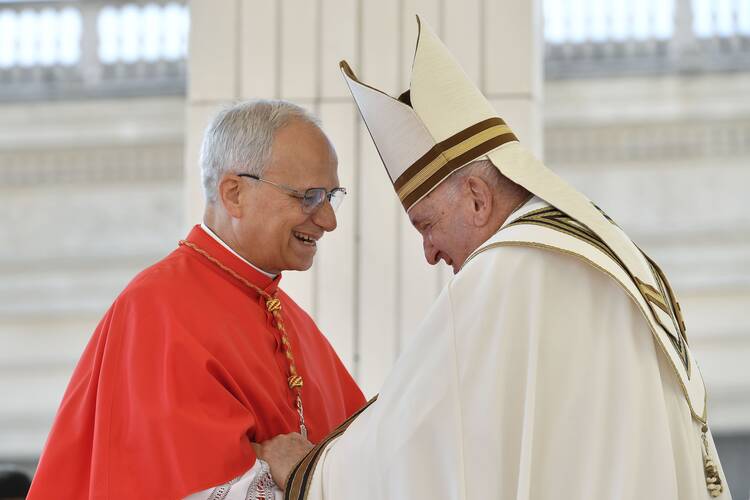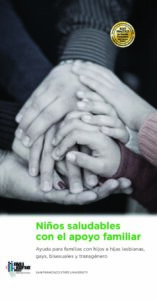Ever since Pope Leo XIV’s election, I’ve been reflecting on an interaction I had in 2015 with Gustavo Gutiérrez, O.P., a founder of liberation theology, advocate for the poor and, like the new pope, a Peruvian citizen. Back then, I was a PhD student at Fordham University, where the Dominican priest had just given a public lecture and met with the theology department. My friend, a fellow student, volunteered to give Father Gutiérrez a ride to JFK Airport for the final leg of his trip. We packed the car with graduate students, excited to spend time with one of our heroes.
As my friend drove, we peppered Father Gutiérrez with questions. What was it like defending his work to the Vatican in the 1980s? What did he think of Pope Francis? Then one of us asked him about the future of liberation theology: “Who are the poor of the 21st century?”
I was stunned by his frank response: “The church needs to better understand the plight of LGBT people.”
At the time, Father Gutiérrez was in his mid-80s, but he was well-attuned to society’s rapidly changing understanding of queer folks and familiar with LGBTQ-affirming movements in Catholic theology. For Father Gutiérrez, acknowledging the suffering of queer people meant seeing them at the center of God’s unfolding plan for the world and striving to address their most pressing needs—what Catholic social teaching describes as the “preferential option for the poor.”
Father Gutiérrez’s concern for the LGBTQ poor stood in stark contrast to official church teaching, which often characterizes us as selfish and self-seeking. The catechism, for example, condemns same-sex acts as “intrinsically disordered” and “contrary to the natural law. They close the sexual act to the gift of life. They do not proceed from a genuine affective and sexual complementarity. Under no circumstances can they be approved.”
During the pontificates of John Paul II and Benedict XVI, Vatican officials reinforced the church’s official teaching on homosexuality through pronouncements on ecclesial and social controversies. Each intervention reinforced the idea that homosexuality threatened the God-established order; each intervention stigmatized and harmed LGBTQ folks even more.
In 1986, the Congregation for the Doctrine of the Faith published its “Letter to the Bishops of the Catholic Church on the Pastoral Care of Homosexual Persons.” Under no circumstances, the document argued, could bishops, priests, dioceses or parishes support individuals or groups that contradicted church teaching. The church, it claimed, had always taught that homosexual activity “thwarts the call to a life of that form of self-giving which the Gospel says is the essence of Christian living.”
Homosexuals pushing for change were threats to Catholic faith “who either ignore the teaching of the Church or seek somehow to undermine it.” For years, the C.D.F. maintained, activists had manipulated church leaders into being more welcoming, but pastors needed to be aware of the dangers that activists posed: “Even when the practice of homosexuality may seriously threaten the lives and well-being of a large number of people, its advocates remain undeterred and refuse to consider the magnitude of the risks involved.”
“The church needs to better understand the plight of LGBT people.”
Throughout the 1990s, the Vatican reiterated its fears of homosexuals. When the West began to expand civil rights for gays and lesbians, the C.D.F. was adamant in its opposition. One of the congregation’s most telling public statements came in 1992. Homosexuality, the C.D.F. stated, is not “a quality comparable to race, ethnic background, etc. in respect to non-discrimination,” but a morally unacceptable and objective disorder.
For that reason, it said, “there is no right to homo-sexuality,” and government limits on homosexuals’ civil rights may be “not only licit but obligatory.” Comparing homosexuality to mental illness and contagious diseases, the Vatican argued that governments should restrict the rights of homosexuals because they threaten God’s plan for marriage, family and society.
According to these historical documents from the C.D.F., government-sanctioned discrimination is necessary to keep same-sex couples from achieving equality in areas of life such as military recruitment, work, adoption, marriage and even housing. The church’s teaching on homosexuality encouraged legal and social conditions resulting in the spiritual, relational and material impoverishment of queer lives.
Twelve years of Pope Francis’ leadership addressed the legacy of these statements. Pope Francis routinely dialogued with LGBTQ Catholics and allies and was public in his friendship with openly gay people. He said that queer folks “have a right to be in a family,” and discouraged parents from disowning their LGBTQ children. In 2023, Pope Francis even called for the decriminalization of homosexuality, a move that reverberated throughout the world. Under his watch, trans people could be baptized and serve as godparents in certain situations. His ministry turned the universal church’s relationship with the LGBTQ community in a new direction.
Still, LGBTQ suffering, exclusion and persecution persist throughout much of the world today. As of 2025, same-sex conduct is punishable by death in seven nations, and at least 63 nations criminalize homosexuality with sentences ranging from decades of prison time to public lashings. In the United States, LGBT people are five times more likely than non-LGBT people to be victims of violent crime.
Pope Francis’ ministry turned the universal church’s relationship with the LGBTQ community in a new direction.
The consequences of homophobia and transphobia are most visible among vulnerable youth. According to the Trevor Project, 52 percent of LGBTQ young people in middle and high school report being bullied in the last year. When compared to their cisgender heterosexual peers, LGBTQ youth are more than four times more likely to attempt suicide. Perhaps most telling, those LGBTQ young people who grow up in religious communities are more than twice as likely to attempt suicide than their non-religious peers.
These facts and figures are a pale reflection of the complex and heartbreaking realities that LGBTQ individuals face, and statistics can never do justice to the irreparable harm that queer people experience due to hatred and exclusion. LGBTQ pain demands the attention of all serious moral and religious leaders.
Which brings us to the current moment.
In recent weeks, along with many other LGBTQ Catholics, I have been closely watching Pope Leo XIV’s words and actions for clues about his intended relationship with our community. Will he revert to John Paul II and Benedict XVI’s treatment of queer people as a threat to society and the church, or does he plan to continue Pope Francis’ legacy of inclusion and dialogue?
So far, we can only speculate, but I am heartened by his early rhetoric on the suffering and poor.
In his introduction at St. Peter’s Square, Leo XIV advocated for “a synodal Church, a Church that walks, a Church that always seeks peace, always seeks charity, always strives to be close especially to those who suffer” (italics mine). Nine days later, in a speech given to the Centesimus Annus Pro Pontifice Foundation, he elucidated the role of the poor in developing the church’s social teaching tradition:
Deeper reflection and study are essential, as well as a commitment to encounter and listen to the poor, who are a treasure for the Church and for humanity. Their viewpoints, though often disregarded, are vital if we are to see the world through God’s eyes. Those born and raised far from the centers of power should not merely be taught the Church’s social doctrine; they should also be recognized as carrying it forward and putting it into practice… I urge you to let the voice of the poor be heard.
Like Father Gustavo Gutiérrez, Pope Leo XIV has embodied solidarity with marginalized communities through his teaching and life. From his time as a missionary in rural Chulucanas to his election as the Bishop of Rome, the poor have been at the heart of his ministry. As Leo XIV’s papacy unfolds, we have every reason to believe that he will continue to center the voices and experiences of the hurting and destitute. My prayer is that Leo XIV’s exercise of Petrine ministry will also include encounters with the LGBTQ poor—encounters that will transform the church’s understanding of queer people and revitalize its commitment to love and care for “the least of these.”



